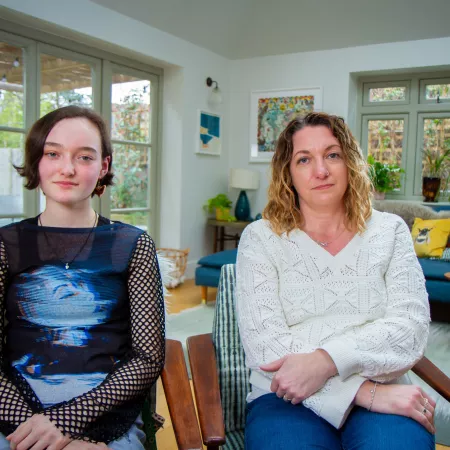
Asking me about my mental health
Tips from young people living with epilepsy about how to check in with them and their mental health, whether you're a friend or a professional supporting them.
Isolation is often associated with being physically alone, but you can feel isolated in a room full of people.

As a young person with epilepsy, isolation is a feeling you may know well. You may choose to isolate and not socialise – or you may feel that isolation has been forced upon you. Either way, you probably feel like you’re the only one going through this. Are we right?
But you’re not alone.
Sometimes isolation is triggered by a fear of potential embarrassment. Does the thought of having a seizure in public or a social setting make you want to avoid parties, theatre trips, sporting events and large gatherings? Or maybe you’re worried about your friends and family being stressed looking after you while you have a seizure? Sometimes the guilt and fear of what others will experience witnessing your seizure can prompt isolation too. Isolation can be just as hard to deal with as seizures themselves.
Social isolation is often caused by stigma, or someone else’s prejudice and perceptions of what you can and can’t do when you have epilepsy. You may feel left out or excluded from social activities simply because others don’t understand epilepsy. But we can change that, by educating others. You know that epilepsy doesn’t define you and it shouldn’t limit your opportunities.
Other young people with epilepsy describe the impact on their mental well being as:
It has made me very self-conscious about whether people may stare or say things if I have an episode. For that reason, I do not venture very far from home and spend a lot of time locked away in my bedroom.Young person living with epilepsy
Constant feeling of being left out. I’m not able to do what most people around me are able to do.Young person living with epilepsy
Young people with epilepsy, who responded to our survey, said their mental wellbeing has affected different areas of their social life, including:
77% of young people who responded said living with epilepsy has had an impact on time spent with friends
50% of young people who responded said living with epilepsy has had an impact on time spent with family

'I wouldn’t really sleep. I became really anxious when I was around close friends and family because the possibility of having a seizure ran on my mind constantly. I became very paranoid when someone would ask me if I was alright as I just didn’t want to feel like I was burdening someone else with my problems.'

'Overtime, I felt incredibly withdrawn and isolated, it just became easier letting my parents control the majority of my life rather than make my own decisions.'
Chat to others to share your experiences and support others to overcome their isolation challenges. Join the Youth Voice Network or come along to our Virtual Youth Clubs to meet others who 'get it'.
Your epilepsy nurse may be able to point you in the direction of a local group who meet face to face or virtually, so you can build your confidence socially with like-minded people who understand. There are also Facebook or Instagram groups for epilepsy where you can connect with other people going through the same thing. Conversations can be started, experiences shared, and you may even be able to link up with these people if they are local.
Take every opportunity to express any negative emotions – this will help you reduce the feelings of isolation.
Reach out to your friends and family, they love you and want the best for you. Spend some time with close family and friends, people you can open up to and do activities that will not be affected by your epilepsy, or with people that you feel comfortable around having a seizure.
Listen to some podcasts or YouTube videos of other people’s stories and experiences with seizures, such as The Sunflower Conversations , it will help you to feel less alone.
Whether it be getting involved in your community or joining an organisation online. Volunteering and giving something back is a great way to meet people, and to also improve your self-worth.
If you feel you are experiencing isolation, please contact your GP.
If you are struggling with feeling isolated, remember, you are not alone.
Try downloading one of these apps that young people recommend:
If you feel like you would like to talk to someone, reach out to one of the organisations below. There are people ready and waiting to support you:
Find further signposting and how you can receive support from Young Epilepsy.
For anyone struggling with their mental health, we have partnered with SHOUT, a FREE 24/7 confidential text service.
To start a conversation Text PURPLE to 85258
Make people around you aware of epilepsy: it's a weight off your chest and people can often misunderstand what it actually is.Young person living with epilepsy

Tips from young people living with epilepsy about how to check in with them and their mental health, whether you're a friend or a professional supporting them.

Learn how young people with epilepsy can access mental health support, including where to find help and tips for starting the conversation.

Discover helpful tips for improving sleep quality, especially for those with epilepsy, from bedtime routines to creating a sleep-friendly environment.
A space for young people, aged 13+, who are living with epilepsy, for them to share, learn and find support.